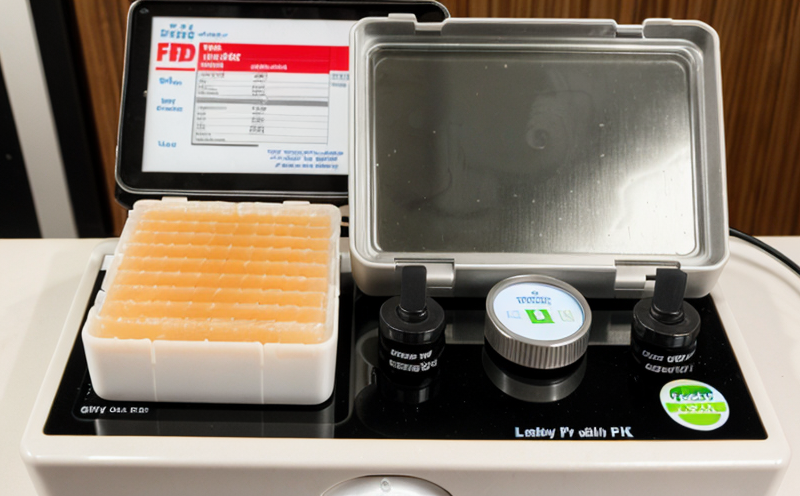ISO 3596 Phospholipid Quantification in Edible Oils
The quantification of phospholipids in edible oils is a critical process in ensuring product quality and compliance with international standards. This method, standardized under ISO 3596, allows for accurate determination of the phospholipid content in various edible oil types such as vegetable oils, animal fats, and blended fats.
Phospholipids play a vital role in the stability, texture, and nutritional value of food products. Their presence can influence factors like emulsification ability, oxidative stability, and shelf life. Therefore, precise quantification is essential to maintain product integrity and ensure safety for consumers.
The procedure involves several steps including sample preparation, extraction, and subsequent analysis using spectrophotometric methods or other specified techniques. The accuracy of the results depends heavily on standardized procedures outlined in ISO 3596. This ensures that laboratories can consistently produce reliable data across different batches and locations.
Sample preparation typically includes degumming processes to remove proteins and other impurities, followed by extraction with organic solvents like chloroform-methanol mixture according to the specified ratio. Once extracted, the sample is subjected to derivatization if necessary before analysis.
The analytical method used can vary but commonly employs UV-Vis spectrophotometry where phospholipids absorb light at specific wavelengths characteristic of their structure. Other methods might include chromatographic techniques like HPLC (High Performance Liquid Chromatography) depending on the complexity and requirements of the sample matrix.
Acceptance criteria for results depend upon intended use but generally aim to identify any deviations from expected levels that could impact product quality or safety. For instance, excessive phospholipids may indicate contamination issues while insufficient amounts might suggest poor formulation practices.
Compliance with this standard is crucial not only for meeting regulatory requirements but also for maintaining consumer trust and ensuring consistent product performance across different batches and geographical regions.
Eurolab Advantages
EuroLab provides unparalleled expertise in the field of food & feed testing. With a team of experienced scientists and technologists, we ensure that every test conducted adheres strictly to international standards like ISO 3596.
- Accurate Results: Our state-of-the-art laboratories equipped with advanced instrumentation guarantee precise measurements and reliable data.
- Certified Personnel: All our staff are trained rigorously and certified by relevant bodies to handle complex analyses accurately.
- Comprehensive Services: Beyond just phospholipid quantification, we offer a wide range of additional services tailored specifically for the food & feed sector.
- Global Recognition: Recognized worldwide for our high standards and commitment to excellence, EuroLab is your partner in quality assurance.
We pride ourselves on delivering accurate, timely results that meet or exceed client expectations. Let us be part of your journey towards better food safety practices!
Why Choose This Test
The quantification of phospholipids in edible oils is essential for several reasons:
- Quality Assurance: Ensuring consistent product quality across different batches and geographical regions.
- Regulatory Compliance: Meeting stringent regulatory requirements set by various authorities worldwide.
- Consumer Trust: Maintaining consumer confidence through transparent, reliable testing processes.
- Nutritional Value: Understanding the nutritional profile of products to optimize health benefits.
- Oxidative Stability: Assessing how well fats resist oxidation which impacts shelf life and taste.
- Sustainability: Evaluating raw materials used in production for their sustainability credentials.
By choosing EuroLab, you benefit from our comprehensive services designed to meet these critical needs effectively. Our commitment to precision and reliability makes us the ideal partner for your testing requirements.
Environmental and Sustainability Contributions
The quantification of phospholipids in edible oils contributes positively towards environmental sustainability initiatives by:
- Improving Resource Efficiency: By optimizing production processes based on accurate phospholipid levels, resources are used more efficiently.
- Promoting Renewable Resources: Understanding the lipid content helps in selecting sustainable sources of raw materials.
- Reducing Waste: Accurate quantification allows for better management and reduction of waste streams.
- Enhancing Product Quality: Higher quality products lead to less resource input per unit output, contributing to overall sustainability.
EuroLab plays an active role in promoting these practices through our rigorous testing protocols. Our services not only enhance product performance but also support broader environmental goals.





